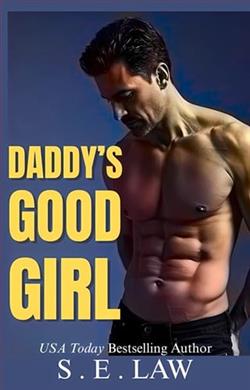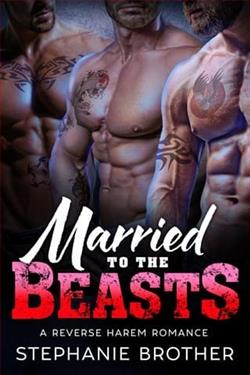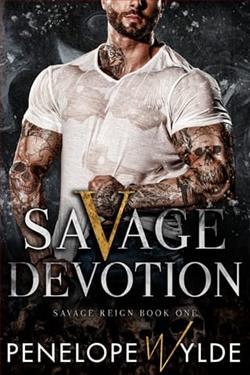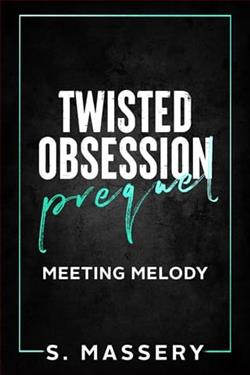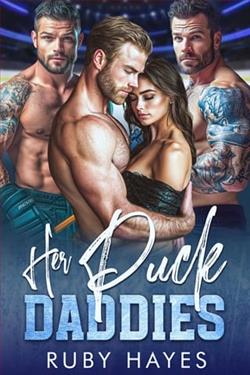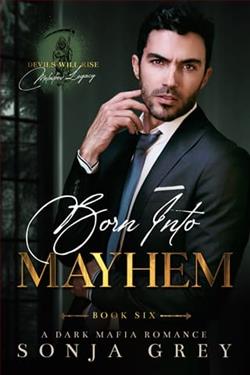Page 37 of The Mafia King's Baby
I can’t do it. The thought of losing her now, after everything we’ve shared, feels impossible. She’s seen me at my worst and hasn’t run. She’s helped me bury a federal agent without breaking completely. She’s stronger than I gave her credit for, and that strength draws me to her in ways I don’t fully understand.
The highway curves ahead, and I adjust the steering to follow it. Beside me, Celia shifts in her seat, and I catch a glimpse of her profile in the dashboard lights. Beautiful and haunted, changed by what we’ve done together but not broken by it.
Not yet, anyway.
We still have a long drive ahead of us, and longer challenges waiting at the end of it. Lang’s death will bring consequences I can’t fully predict, setting forces into motion that will test both of us in ways we haven’t imagined yet, but for now, we’re safe, we’re together, and we’ve successfully eliminated the most immediate threat to our survival.
It’s not much, but it’s enough to build on.
The miles roll by beneath our wheels, carrying us away from the grave and toward whatever comes next. In the passenger seat, Celia finally breaks the silence.
“I need to ask you something.”
I glance at her, noting the serious tone in her voice. “What?”
“When this is over—when we’re safe—what happens to us?”
The question cuts to the heart of everything I’ve been trying not to think about. What happens to us? What kind of future is possible for a Russian mobster and the civilian he’s dragged into his world? What kind of life can we build on a foundation of shared criminality and mutual dependence?
“I don’t know.”
“But you’ve thought about it.”
I have thought about it. More than I should, and more than is smart for someone in my position. I’ve thought about what it would be like to wake up next to her every morning, to build something real and lasting with someone who knows exactly who I am and what I’ve done. “Yes.”
“And?”
I pull the car into the right lane to pass a slow-moving truck, using the maneuver to buy time to organize my thoughts. How much honesty is too much? How much hope is dangerous? “I think we have a chance. If we’re careful, if we’re smart, if we get lucky.” I merge back into the left lane and settle into a steady cruising speed. “But it won’t be easy.”
She makes a low sound but doesn’t ask more questions. She doesn’t ask me to clarify if I see building a future with her, or us going separate ways. I’m afraid she’s envisioning the second and isn’t in the right frame of mind to discuss the first option, so I let it rest for now.
The best things in life require sacrifice, risk, and the willingness to fight for something that matters more than safety or comfort.What we have—whatever it is—falls into that category, at least for me. I don’t know yet how she feels about that. The realistic side of me knows she’ll flee from a murderingbratva pakhanas soon as she can, but a tiny, hopeful part of me clings to the idea that instead, she’ll find a reason to stay.
We drive through the night, and gradually I notice Celia’s questions becoming stranger and more disconnected. She asks about the color of the moon, whether I think Lang had a dog before deciding he didn’t, because he tried to kick Sariah, and if the trees we pass are the same species that grow in Russia. The random thoughts she speaks aloud without context or connection reveal she’s unraveling more clearly than any bald statement could.
I keep expecting her to break down completely, to finally process what we’ve done and fall apart. Instead, she seems to be floating somewhere outside herself, observing everything from a distance that protects her from the full impact of events.
Then, somewhere outside Susanville, she starts crying.
Not sobbing or wailing, but quiet tears accompanied by soft sniffles. I pull off at the next exit and find a deserted parking lot behind a closed gas station. When I stop the car and turn off the engine, the silence is broken only by the sound of her breathing.
“Celia?”
She doesn’t respond as she continues crying with the kind of steady, exhausted grief that suggests she’s finally allowing herself to feel everything she’s been holding back. I reach for her tentatively, not sure if physical comfort is what she needs or wants.
She doesn’t pull away when I touch her shoulder, so I pull her closer, letting her cry against my chest while I hold her. Her tears soak through my shirt, warm and genuine, and I stroke her hair without conscious thought.
“It’s okay,” I murmur, though we both know it’s not. Nothing about this situation is okay and won’t be okay for a long time but lies are sometimes kinder than truth.
She cries for ten minutes, maybe fifteen, releasing pressure that has been building since the moment Lang broke into her house. When she finally pulls away, her eyes are red but clear, focused in a way they haven’t been for hours. “I’m sorry.”
“For what?”
“For falling apart.”
I smooth a strand of hair away from her face, letting my fingers linger against her cheek since she isn’t recoiling. “You didn’t fall apart. You’re still here, still functioning, and still helping. That’s not falling apart.”
“It feels like it.”










